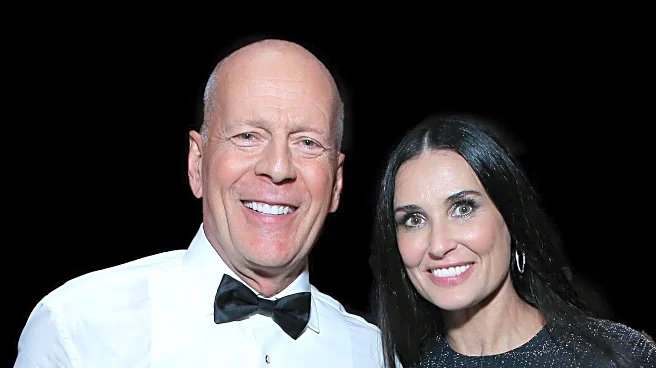What's Happening?
Demi Moore has publicly praised Emma Heming Willis for her dedication as a caregiver to Bruce Willis, who is experiencing a decline in health due to frontotemporal dementia. Moore, who was married to Bruce Willis for 13 years and shares three daughters with him, discussed the challenges faced by Heming Willis during an interview with Oprah Winfrey. Heming Willis is set to release a book titled 'The Unexpected Journey,' which highlights her experiences as a caregiver. Moore emphasized the importance of caregivers taking care of themselves to effectively support others. Heming Willis recently made the difficult decision to move Bruce Willis into a safer home with 24/7 care, following his diagnosis of aphasia and subsequent progression to dementia.
Why It's Important?
The situation underscores the significant challenges faced by caregivers, particularly when dealing with progressive neurological conditions like dementia. Emma Heming Willis' experience highlights the emotional and logistical complexities involved in caregiving, which can resonate with many families across the U.S. dealing with similar circumstances. The public acknowledgment by Demi Moore brings attention to the need for support systems for caregivers, who often face judgment and criticism. Heming Willis' upcoming book may serve as a valuable resource for those navigating the caregiving journey, offering insights and strategies for managing personal well-being while caring for loved ones.
What's Next?
Emma Heming Willis' book, 'The Unexpected Journey,' is scheduled for release on September 9, and is expected to provide guidance and support to caregivers facing similar challenges. The book may spark discussions on the importance of caregiver support and the need for resources to assist those in similar situations. As Bruce Willis continues to receive care, his family's approach may influence public perceptions and policies regarding caregiving and dementia care.
Beyond the Headlines
The story highlights broader societal issues related to caregiving, including the emotional toll and societal expectations placed on caregivers. It raises questions about the availability of resources and support for families dealing with dementia and other chronic conditions. The narrative also touches on the evolving roles within blended families and the complexities of maintaining relationships amidst health crises.










